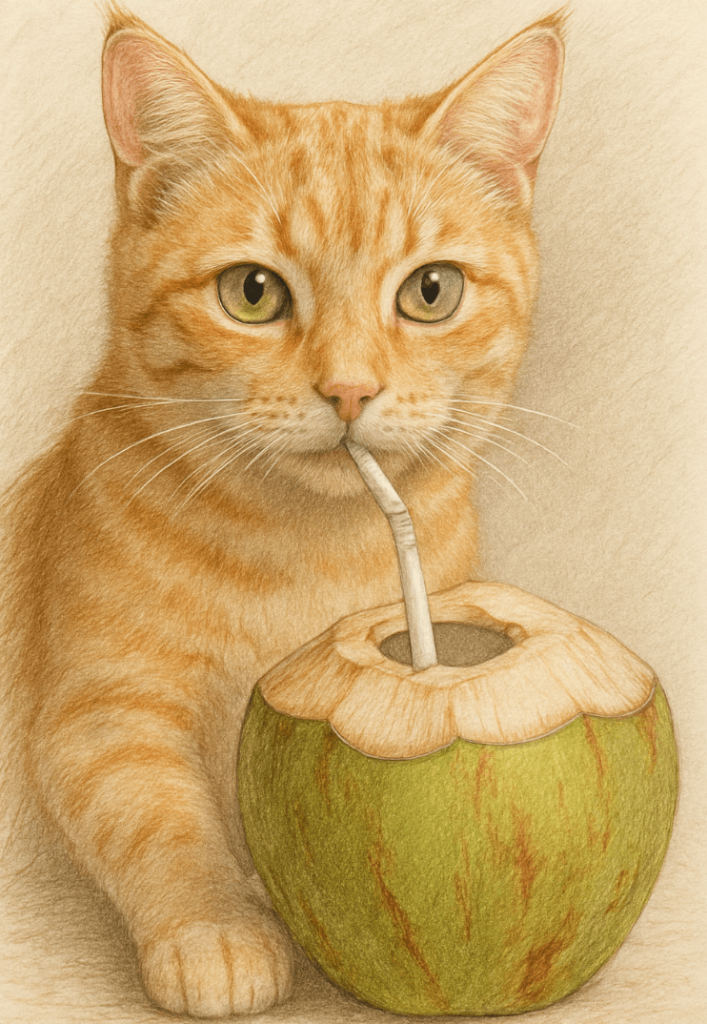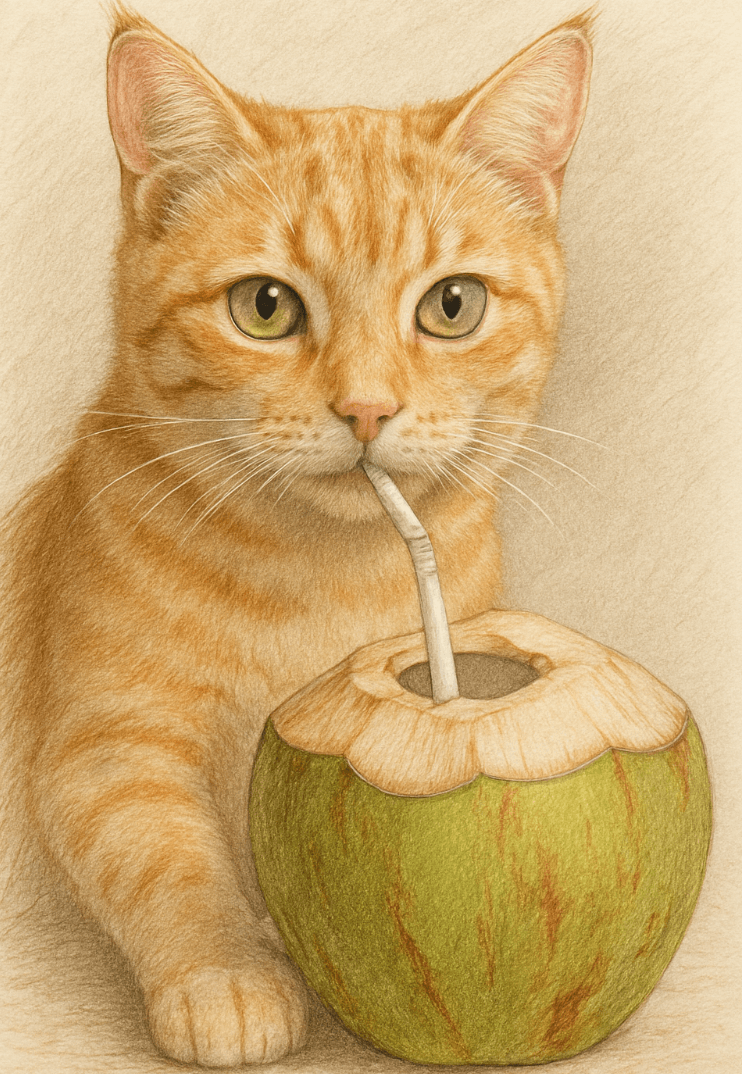Can Cats Have Coconut Water?
Coconut water has gained popularity as a refreshing and hydrating drink for humans, but what about our feline friends? Many cat owners wonder if coconut water is safe for cats or if it could pose potential risks. While cats are obligate carnivores and primarily need water for hydration, some pet parents consider coconut water as an alternative to plain water. However, understanding the effects of coconut water on your cat’s health is crucial before offering it. In this blog post, we’ll explore whether cats can safely consume coconut water, its potential benefits and risks, and safer alternatives to keep your furry companion hydrated and happy.
Potential Risks of Giving Coconut Water to Cats
While coconut water may seem harmless, it contains certain components that could be problematic for cats. Here are some risks to consider before offering it to your feline friend.
High Sugar Content:
Coconut water contains natural sugars, which can upset your cat’s digestive system and lead to issues like diarrhea or vomiting.Electrolyte Imbalance:
Though electrolytes are beneficial for humans, cats have different nutritional needs, and excessive electrolytes may disrupt their balance.Allergic Reactions:
Some cats may be allergic to coconut or its components, resulting in skin irritation, swelling, or respiratory issues.Added Ingredients in Packaged Coconut Water:
Many store-bought coconut waters contain added sugars, preservatives, or flavorings that are harmful to cats.Not a Natural Part of Their Diet:
Cats are not biologically equipped to process plant-based liquids like coconut water, which can cause unnecessary stress on their systems.
These risks highlight why caution is essential when considering coconut water for your cat. Always prioritize their health over curiosity.
Potential Benefits of Coconut Water (If Given Safely)
In rare cases, coconut water may offer minor benefits for cats, but only under specific circumstances and in moderation. Here’s what you should know.
Hydration Support:
If your cat is dehydrated and refuses plain water, a small amount of plain coconut water might temporarily encourage fluid intake.Natural Electrolytes:
The potassium and magnesium in coconut water can help replenish electrolytes, though this is typically unnecessary for healthy cats.Low-Calorie Option Compared to Other Treats:
Coconut water is lower in calories than many sugary human drinks, making it a slightly better option if you want to experiment cautiously.Antioxidant Properties:
Coconut water contains antioxidants that may support overall health, though cats derive most of their nutrients from animal-based sources.Alternative to Plain Water for Picky Drinkers:
Some cats may find the mild sweetness of coconut water more appealing than plain water, encouraging them to drink more.
While these benefits exist, they are minimal and should not outweigh the potential risks of feeding coconut water to your cat.
Check this guide 👉Can Cats Eat Turkey Organs? Best 7 Expert Tips!
Check this guide 👉Can Cats Eat Duck Feet? Best 7 Expert Tips!
Check this guide 👉Can Cats Eat Croutons? Best 7 Expert Tips!

Safe Hydration Options for Cats | Risks of Unsafe Drinks for Cats |
|---|---|
Fresh, clean water | Sugary beverages like soda or juice |
Wet cat food | Milk or dairy products (lactose intolerance) |
Bone broth (unsalted, unseasoned) | Alcohol or caffeine-containing drinks |
Ice cubes made from water | Artificially flavored or sweetened drinks |
Herbal teas (consult vet first) | Coconut water with additives or sugar |
How to Safely Introduce Coconut Water to Your Cat
If you decide to offer coconut water to your cat, it’s critical to do so cautiously and in moderation. Follow these guidelines to minimize risks.
Choose Plain, Unsweetened Coconut Water:
Avoid any coconut water with added sugars, flavors, or preservatives, as these can harm your cat.Offer a Small Amount First:
Start with just a teaspoon to see how your cat reacts before giving larger quantities.Monitor for Adverse Reactions:
Watch for signs of digestive upset, such as vomiting, diarrhea, or lethargy, after consumption.Limit Frequency:
Coconut water should only be given occasionally, not as a regular part of their diet.Consult Your Veterinarian:
Always seek professional advice before introducing new foods or drinks to your cat’s routine.
By following these steps, you can ensure your cat stays safe while experimenting with coconut water.
Signs Your Cat May Be Dehydrated
Dehydration is a serious concern for cats, and recognizing the signs early can prevent complications. Here’s what to look for if you suspect your cat isn’t drinking enough water.
Dry Gums:
Healthy gums should feel moist; dry or sticky gums indicate dehydration.Lethargy or Weakness:
A lack of energy or reluctance to move can signal that your cat isn’t getting enough fluids.Loss of Skin Elasticity:
Gently pinch the skin on your cat’s neck—if it doesn’t snap back quickly, they may be dehydrated.Decreased Appetite:
Cats often lose interest in food when they’re dehydrated, as their bodies prioritize water intake.Sunken Eyes:
Sunken or dull eyes are a clear sign of severe dehydration requiring immediate veterinary attention.
Addressing dehydration promptly ensures your cat remains healthy and hydrated.
Common Mistakes to Avoid When Hydrating Your Cat
Proper hydration is vital for your cat’s health, but mistakes can lead to unintended consequences. Here are some pitfalls to avoid.
Forcing New Drinks on Your Cat:
Introducing unfamiliar liquids like coconut water without testing first can upset their stomach.Overlooking Plain Water:
Cats thrive on fresh, clean water—don’t assume they need flavored alternatives.Ignoring Signs of Dehydration:
Delaying action when your cat shows signs of dehydration can lead to serious health issues.Using Human Drinks as Substitutes:
Beverages like milk, soda, or sports drinks are unsafe and should never replace water.Neglecting Wet Food:
Wet cat food is an excellent source of hydration—skipping it means missing out on a key way to keep your cat hydrated.
Avoiding these mistakes ensures your cat stays properly hydrated and healthy.
Alternatives to Coconut Water for Hydration
If you’re looking for ways to encourage your cat to drink more, there are safer and more effective options than coconut water.
Flavored Ice Cubes:
Freeze low-sodium chicken broth into ice cubes for a hydrating and enticing treat.Wet Cat Food:
High-moisture canned food provides essential hydration while satisfying their appetite.Fresh Water Fountains:
Cats are often drawn to moving water, so investing in a pet fountain can encourage drinking.Unsalted Bone Broth:
Warm, unsalted bone broth can entice picky drinkers while providing hydration and nutrients.Herbal Teas (Vet-Approved):
Certain herbal teas, like chamomile, may be safe in moderation—but always consult your vet first.
These alternatives cater to your cat’s hydration needs without unnecessary risks.
Understanding Your Cat’s Drinking Habits
Cats have unique drinking behaviors influenced by their instincts and preferences. Understanding these habits helps you address hydration effectively.
Preference for Running Water:
Many cats prefer flowing water over still water, as it mimics natural sources like streams.Sensitivity to Water Taste:
Cats can detect impurities in tap water, so filtered or bottled water may encourage them to drink more.Reluctance to Drink Near Food:
Some cats avoid drinking close to their food bowls due to instinctual cleanliness habits.Increased Thirst Due to Health Issues:
Conditions like kidney disease or diabetes can cause excessive thirst—a vet visit is necessary if you notice this.Low Thirst Drive:
Cats naturally have a low thirst drive, relying on moisture from their food rather than drinking water alone.
Recognizing these habits allows you to tailor your approach to keeping your cat hydrated and healthy.
Frequently Asked Questions About Cats and Coconut Water
Is coconut water toxic to cats?
Not inherently toxic, but it can cause digestive upset and other issues due to its sugar content and electrolytes.
Can kittens drink coconut water?
Kittens should avoid coconut water entirely, as their sensitive systems are more prone to adverse reactions.
How much coconut water can I give my cat?
If at all, limit it to a teaspoon or less, and only occasionally—not as a regular treat.
What should I do if my cat accidentally drinks coconut water?
Monitor them closely for symptoms like vomiting or diarrhea, and contact your vet if issues arise.
Are there healthier alternatives to coconut water for cats?
Yes, fresh water, wet cat food, and unsalted bone broth are safer and more appropriate options.
Prioritizing Your Cat’s Hydration Needs
While coconut water may seem like a trendy option for hydration, it’s not ideal for cats due to its sugar content and potential risks. Instead, focus on providing fresh water, wet cat food, and other safe alternatives to meet your cat’s hydration needs. Always consult your veterinarian before introducing new foods or drinks to ensure your cat’s safety. By staying informed and attentive to your feline friend’s health, you can help them stay happy, hydrated, and thriving for years to come.
Do Cats Have Taste Buds? Best 7 Expert Tips! – Discover how cats experience flavors and why their taste is so unique.
Do Dogs Have Taste Buds? Best 7 Expert Tips! – Discover how dogs experience taste, their preferences, and what it means for their diet and health.
Can Cats Taste Sweet? Best 7 Expert Tips! – Discover why cats can’t taste sweetness, how it affects their diet, and tips to keep them healthy and happy.
Can Dogs Taste Sweet? Best 7 Expert Tips! – Discover how dogs perceive sweetness, which foods are safe, and tips to manage their sweet cravings responsibly.





